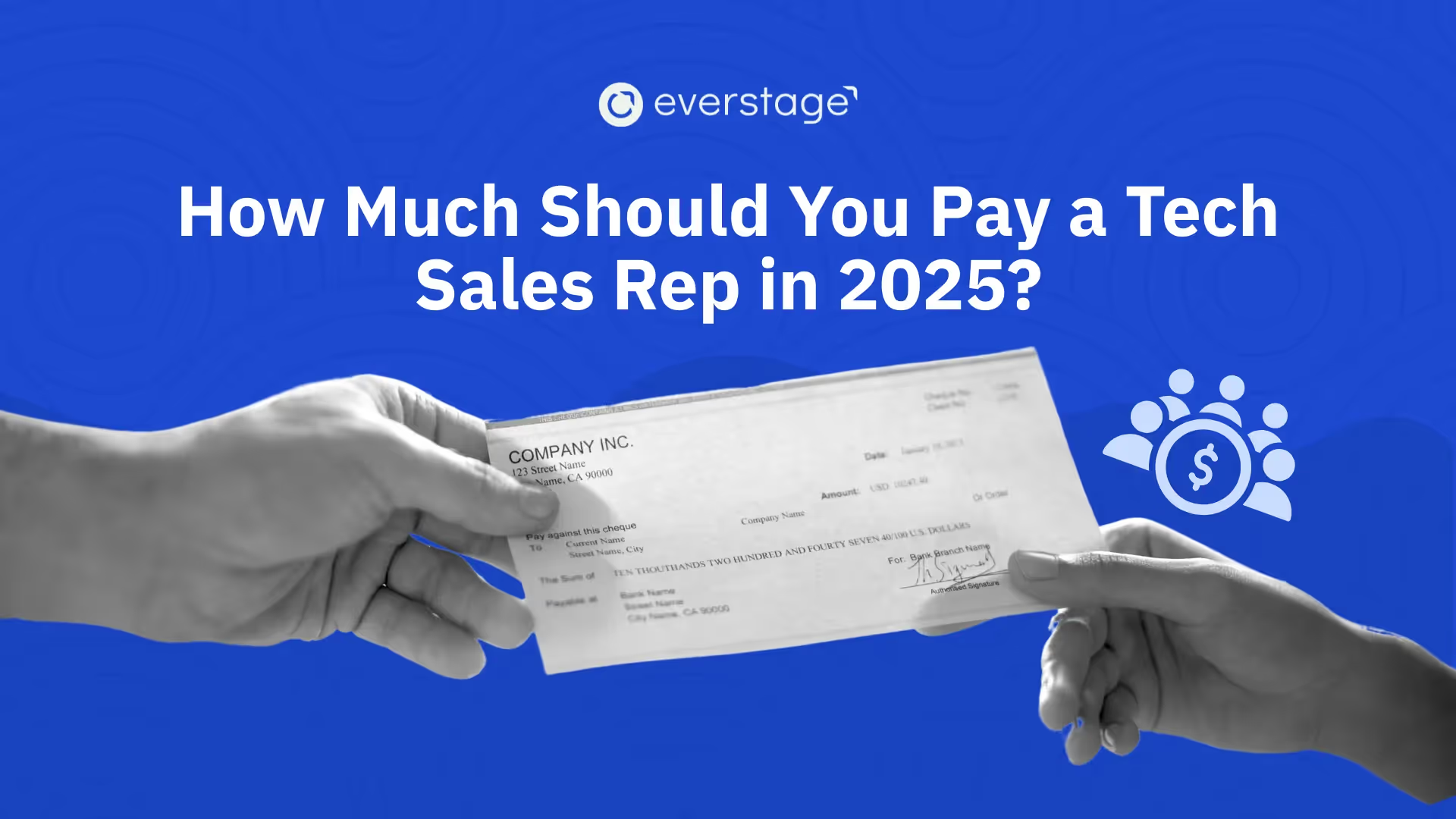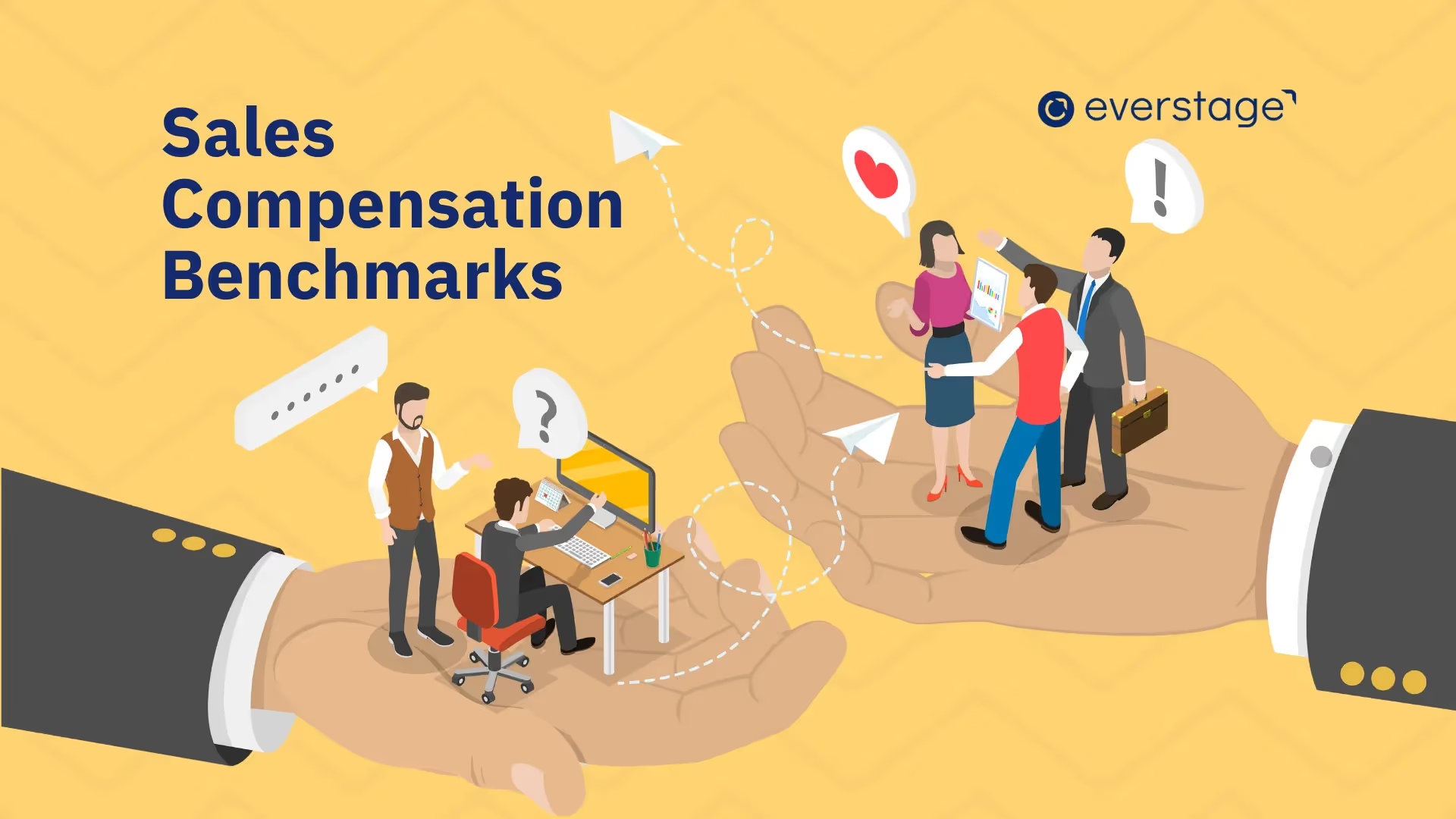Commission-only sales compensation plans reward sales reps solely for the revenue they generate, offering high earning potential but significant risks if not structured well.
- Attract driven, self-motivated sellers eager for performance-based rewards.
- Reduce fixed payroll costs to support leaner operations.
- Require clear targets, fair commission rates, and robust sales support to prevent turnover.
- Succeed best in fast sales cycles where reps own deals end-to-end.
A few months ago, I spoke with a founder who had just onboarded a new sales team. With limited cash flow and big business goals, they decided to skip base salaries and go all-in on commission-only. “It’ll push them to perform,” they said.
But within weeks, reps were frustrated, deals stalled, and turnover spiked. The model wasn’t the problem; the structure was.
A commission-only sales compensation plan pays sales representatives based solely on the revenue they generate. There is no base salary. Reps earn a fixed percentage of each sale. This model directly links earnings to performance. It attracts high-performing, self-motivated sellers. Companies use it to reduce fixed costs and drive results.
Commission-only structures are common in real estate, insurance, and startups. These plans carry high rewards and high risk. Success depends on clear targets, fair commission rates, and strong sales support.
So, in this blog, I’ll walk you through how these commission-only sales compensation plans work, when they don’t, and how to build one that’s fair, motivating, and scalable without draining your team or your pipeline.
Understanding Sales Compensation: Commission vs. Salary
When designing a sales compensation strategy, the first step is understanding the key models that define how reps are paid. At a foundational level, sales compensation typically falls into three categories: fixed salary, commission-based pay, and hybrid models.
1. Fixed Salary
A fixed salary provides consistent, predictable income regardless of performance. This model is common in roles where revenue influence is indirect or where collaboration, support, or technical work outweighs individual selling. Sales managers, customer success managers, and inside sales reps at early pipeline stages often operate on fixed pay.
From the company’s perspective, a fixed salary simplifies payroll and avoids the administrative burden of variable pay calculations. However, it often fails to create a sense of urgency or personal ownership over revenue outcomes.
2. Commission-Based Pay
Commission-based pay directly links a rep’s earnings to their ability to generate revenue. In this model, reps receive a commission percentage of each sale they close. It’s a performance-driven structure that’s common in industries like real estate, automotive sales, insurance, and high-ticket B2B sales.
The core advantage lies in the alignment of both the employer and the employee benefits when revenue grows. This model encourages ownership, hustle, and continuous deal generation.
Organizations using commission-only sales compensation plans must ensure strong sales enablement, ethical guardrails, and transparent tracking systems to maintain trust and long-term retention.
3. Hybrid Models
Hybrid compensation plans blend the stability of a fixed salary with the performance incentives of commission-based pay. This approach is widely used in B2B and SaaS sales teams, where reps often juggle long sales cycles, complex deal negotiations, and multiple decision-makers.
The base salary ensures financial security, while the commission component rewards high performance and revenue impact. According to the Overture Group, many companies are moving away from commission-only models and toward hybrid base-plus-commission structures, which offer more stability without losing performance incentives.
Companies using hybrid models should regularly review plan clarity, payout timeliness, and fairness across roles to keep the structure effective and sustainable.
How Commission-Only Structures Work
A sales commission plan pays reps solely based on the revenue they bring in, there’s no base salary or fixed monthly income. Reps earn a set percentage of every sale. For example, if a rep closes a $10,000 deal at a 10% commission rate, they take home $1,000. If there are no close deals, they earn nothing. It’s a structure built entirely around performance.
For employers, this model eliminates fixed payroll costs and directly ties payouts to results. It’s especially attractive for startups and small businesses with lean budgets or companies scaling rapidly. Since commissions are only paid on revenue generated, it reduces financial risk and simplifies forecasting.
On the rep side, commission-only plans offer unlimited earning potential. Top performers can far exceed traditional salary caps. But the model also comes with income instability. Without a reliable paycheck, reps must manage financial uncertainty, especially during slow periods or long ramp-up times.
To succeed with a commission-only structure, companies need clear commission rules, accurate tracking, timely payouts, and strong sales support. Without these, the model can result in high attrition and low morale. But when implemented thoughtfully, it can create a high-performing, motivated sales culture that thrives on results.
Pros and Cons of Commission-Only Compensation
%20(3).avif)
Advantages
For Employers:
- Reduces fixed labor costs
- Aligns pay strictly with performance
- Attracts self-motivated, high-performing sales talent
- Scales easily with business growth
For Employees:
- Offers uncapped earning potential
- Encourages autonomy and entrepreneurial mindset
- Reward top performers proportionally
- Provides flexibility in sales approach and schedule
Disadvantages
For Employers:
- Makes expense forecasting difficult
- Increases risk of rep burnout and high turnover
- May lead to aggressive or short-term sales tactics
- Requires strong infrastructure and plan transparency
For Employees:
- Creates income volatility and financial stress
- Offers no guaranteed paycheck or safety net
- Difficult to manage during slow sales periods or ramp-up
- May impact long-term job satisfaction or loyalty
Commission-Only Plans & Their Usage in Predominant Industries/Roles
Commission based sales compensation plans are most effective in industries where revenue can be directly attributed to individual performance and where the sales cycle is relatively short. These plans thrive in environments that are transactional, competitive, and margin-driven, offering high earning potential to motivated reps who prefer autonomy over stability.
Here are some of the most common industries and roles where commission-only structures are widely used:
- Real Estate: Agents earn a percentage of the final property sale, often without any base salary. The payout structure directly reflects deal size and volume.
- Automotive Sales: Car salespeople typically work on commission, earning per vehicle sold. Fast-paced showrooms and short sales cycles make this a natural fit.
- Insurance: Agents are paid per policy sold life, health, auto, or commercial, making this a longstanding commission-only field.
- Direct Sales & MLM: Representatives earn based on personal sales and, in many models, a percentage from downline team sales. Compensation is fully performance-based.
- Technology & SaaS Startups: Especially at early stages, account executives are sometimes offered commission-only roles to reduce upfront hiring costs and scale fast.
- Financial Services: Brokers and advisors are paid for selling investment products, managing client portfolios, or closing high-value financial deals.
- Pharmaceutical Sales: Some pharma reps earn commissions tied to prescription rates, device placements, or physician conversions.
- Travel & Hospitality: Travel agents and sales teams earn commissions from bookings, upsells, and partnerships with hotels or tour operators.
- Affiliate Marketing: Affiliates receive commissions for every lead, click, or conversion they drive, based on agreed terms with advertisers.
- Recruitment & Staffing: Recruiters are paid a percentage of the candidate’s annual salary upon successful placement, especially in executive search or contract hiring.
These roles often appeal to professionals who are confident in their sales abilities, thrive under pressure, and value flexibility over fixed income. While not suited for every personality type or business model, commission-only compensation structures continue to play a key role in high-impact, performance-based selling environments.
Should You Try a Commission-Only Model for Your Business?
Commission-only sales compensation plans might look like a smart way to reduce overhead and boost performance. But before you commit to this model, it’s worth asking: Is it the right fit for your business, your sales process, and your team members?
Below are the key factors you should evaluate before going all-in on a commission-only approach.
1. Business Fit
Commission-only plans work best in industries with short sales cycles and direct revenue influence, like real estate, insurance, and direct sales. If your reps own the entire sales process and close quickly, this model can be effective. But in B2B or SaaS, where sales are complex and collaborative, it’s often a poor fit.
2. Rep Commitment
Without a fixed salary, your reps must be fully committed and self-motivated. Disengaged sellers can waste valuable leads and opportunities. This model only works if you're confident your team will stay accountable without financial safety nets.
3. Turnover Risk
Commission-only roles typically see higher attrition. Reps may leave for more secure income elsewhere, especially if early results are poor or the comp plan lacks clarity. Be prepared to invest more in recruiting and retention.
In the promotional products industry, only 23% of sales professionals said it was their most desired model, even though 35% still work under it, a number that’s steadily falling year-over-year.

4. Job Pressure
The pressure to perform without a base can lead to short-term thinking. Reps may push deals too aggressively just to hit commission goals, which can damage customer trust and brand integrity over time.
5. Company Loyalty
Without salary or long-term incentives, reps may not feel tied to your brand. They can easily be lured away by slightly better offers or faster-closing sales roles, making it harder to build a stable team.
6. Support & Structure
A sales commission plan needs a strong infrastructure. That includes onboarding, lead support, a clean CRM, and clear payout terms. Without these, even high performers will struggle and lose motivation.
7. Earning Potential
Make sure reps can realistically earn competitive income based on your product, pricing, and sales cycle. If earnings are inconsistent or below market expectations, your comp plan will repel rather than attract talent.
8. Alternative Models
If you're not fully ready for a pure commission-only plan, consider draw-based or hybrid models. These offer performance incentives while giving reps some financial stability, especially during ramp-up or slow months.
A commission-only plan can work, but only if you build the right infrastructure to support it. Without clear incentives, rep readiness, and operational discipline, you may save on fixed costs upfront only to lose far more in performance, retention, and brand equity down the road.
Designing an Effective Commission-Only Plan
If you’ve decided to implement a commission-only sales compensation plan, the next step is building a structure that drives results without causing friction. A well-designed plan should not only motivate your team but also protect your business from legal, operational, and retention risks.
Below are the essential elements to consider when creating a commission model that actually works.
1. Commission Rates
Start with setting competitive and sustainable commission rates. These should reflect your industry norms, average deal sizes, and rep effort. If rates are too low, the plan won’t motivate. If they’re too high, it may hurt margins. Benchmark against similar roles to strike the right balance.
2. Performance Metrics
Define clear, measurable targets and milestones that align with your revenue goals. Whether it's the number of closed deals, total contract value, or renewals, reps should know exactly what success looks like. Consistent metrics help standardize evaluations and reduce disputes.
3. Payment Schedules
Timely and transparent commission payouts are critical to rep trust. Clarify when commissions are paid upon signed contracts, full payment, or product delivery, and stick to that schedule. Delays in payment are one of the top reasons reps leave commission-only roles.
4. Support and Training
Even in commission-only setups, reps can’t be left to fend for themselves. Provide onboarding, product education, objection handling frameworks, and access to sales enablement tools. Ongoing support directly affects performance and retention.
5. Plan Simplicity & Transparency
Avoid over-complicated commission structures. If your reps can’t calculate their own earnings in a few seconds, the plan is too complex. A simple, transparent model builds confidence and helps reps stay focused on selling, not decoding spreadsheets.
6. Caps, Tiers, & Accelerators
Consider using accelerators to reward overperformance. For example, increasing the total commission rate once a rep hits 120% of the sales quota can keep top performers engaged. Avoid hard caps unless absolutely necessary, as they can demotivate your best sellers.
7. Legal Compliance
Always ensure that your plan adheres to local labor laws. This includes minimum wage regulations, classification of workers (W-2 vs 1099 in the U.S.), and payout timing. Commission-only plans must be documented carefully to avoid compliance issues down the line.
8. Quota Setting
Set realistic, data-driven quotas that challenge reps without being out of reach. Use historical performance, territory potential, and average sales cycles to inform these targets. Stretch sales goals are fine as long as they’re rooted in reality.
9. Clawback Clauses
If your business involves long return windows or potential deal cancellations, include clear clawback rules. Reps should understand under what conditions commissions may be reversed, such as customer churn or non-payment.
Managing commission-only plans manually can lead to miscalculations, delays, and rep mistrust. Everstage helps automate commission workflows, track real-time performance, and ensure payout accuracy so you spend less time troubleshooting and more time driving sales outcomes.
Transitioning to a Commission-Only Structure: Steps and Considerations
Switching to a commission-only sales compensation plan isn’t just a comp adjustment, it’s a fundamental shift in how your sales team operates, earns, and stays motivated. A 2024 Alexander Group survey found that 28% of companies are now integrating incentive pay into newly created roles to boost productivity and optimize payroll costs.
%20(4).avif)
To ensure the transition is smooth and successful, you need to plan carefully, communicate clearly, and support your reps every step of the way. Here's how to do it strategically:
1. Evaluate Your Current Compensation Model
Start by analyzing what’s currently working and what isn’t. Are your reps consistently hitting quota? Is your current pay structure driving the right behaviors? Pinpoint areas where a commission-only model could boost accountability or reduce fixed costs, especially if your current structure rewards activity over outcomes.
2. Benchmark Against Industry Standards
Before finalizing your plan, look outward. Research what similar companies in your industry are offering, especially those using commission-only structures. Understand common commission rates, payout frequency, and typical rep performance levels. This helps you set realistic expectations and remain competitive in your hiring.
3. Communicate the Change Clearly
When you’re ready to roll out the shift, don’t just send an announcement; host a conversation. Walk your team through why this change is happening, how it benefits them, and what they can expect. Transparency and empathy matter. Reps need to feel that you’re not just cutting costs but offering them a fair, motivating structure.
4. Equip Reps with Tools and Training
Success under a commission-only plan depends on preparation. Make sure your reps are fully trained on your product, pricing, pitch, and pipeline management. Equip them with a CRM, battle cards, call scripts, objection-handling frameworks, and any resources they’ll need to hit the ground running.
5. Monitor Performance and Iterate
Don’t treat your new plan as a set-it-and-forget-it system. Track early performance KPIs, listen to feedback, and be ready to make adjustments. Look for signs of burnout, drop-offs in morale, or misaligned incentives. Small tweaks in commission rate or quota thresholds can make a big difference in traction.
A commission-only sales compensation plan can transform your sales engine, but only if it’s rolled out with care. By taking a structured, people-first approach, you’ll reduce disruption, earn trust, and give your reps the foundation they need to thrive in a high-performance, variable-pay environment.
Conclusion
Commission-only sales compensation plans can drive exceptional results but only when built on a foundation of clarity, fairness, and support. They’re not just about reducing payroll costs or pushing reps harder.
They’re about designing a system that aligns performance with reward, gives high-performers and top talent room to grow, and ensures your sales goals are met without compromising team stability or ethics.
If you're considering this model, don’t just replicate what others are doing. Customize it to your sales cycle, team structure, and business maturity. Invest in enablement, define your metrics, and monitor outcomes. The right plan doesn’t just pay when deals close; it builds a culture that performs consistently.
If you're ready to build a commission-only comp plan that actually works, one that drives results and supports your team - we're here to help.
Book a demo with Everstage and see how we help teams design, track, and optimize comp plans that drive results.
Frequently Asked Questions
What is a commission-only sales compensation plan?
A commission-only sales compensation plan pays sales reps solely based on their sales performance, with no fixed base salary. Earnings depend entirely on the revenue they generate.
How do you structure a commission-only sales plan?
A commission-only plan should include clear commission rates, performance metrics, payout timelines, training resources, and legal compliance measures. Simplicity and transparency are key to motivating reps.
What are the pros and cons of commission-only compensation?
Commission-only plans reduce fixed costs and incentivize high performance. However, they carry risks such as income instability, higher turnover, and pressure-driven selling behavior.
Which industries use commission-only compensation?
Industries like real estate, insurance, automotive, direct sales, SaaS startups, and financial services commonly use commission-only models due to their performance-driven nature.
How do commission-only models impact employee retention?
These models can increase turnover if reps feel financially insecure or unsupported. Retention depends on fair quotas, realistic earning potential, and adequate training infrastructure.
Should startups use commission-only structures to scale sales?
Startups may use commission-only plans to manage costs, but success depends on rep commitment, support systems, and ensuring fair, motivating compensation structures.


.avif)



.avif)

